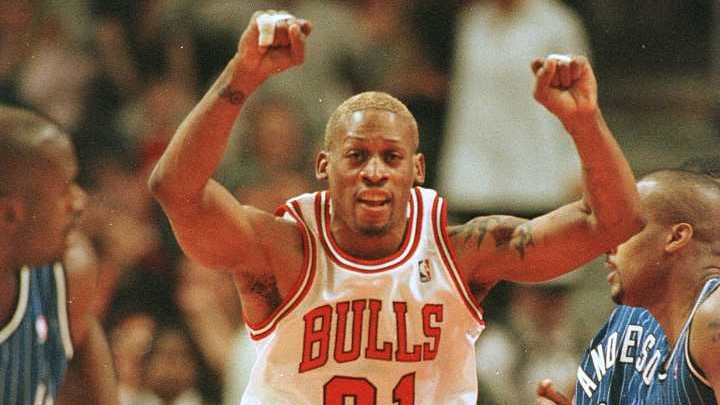
Dennis Rodman (C) of the Chicago Bulls celebrates in the game against the Orlando Magic at the United Center in Chicago, Illinois, February 25, 1996. /VCG
Dennis Rodman (C) of the Chicago Bulls celebrates in the game against the Orlando Magic at the United Center in Chicago, Illinois, February 25, 1996. /VCG
In the newly released Episode 3 of the ESPN Michael Jordan documentary "The Last Dance," Dennis Rodman became the main character. The former member of the Detroit Pistons Bad Boys arrived in Chicago at the age of 34. So how did he continue to claim three rebounding titles while helping Michael Jordan to win another three NBA championships in a row?
In the 1986 NBA Draft, the Pistons brought 25-year-old Rodman to the Motor City. The 2.01-meter-tall, 95-kilogram kid did not have outstanding athleticism or power. He went to North Central Texas College (NCTC) and Southeastern Oklahoma State University. After graduation, Rodman could not find a job and had to work as an overnight janitor at Dallas Fort Worth International Airport.
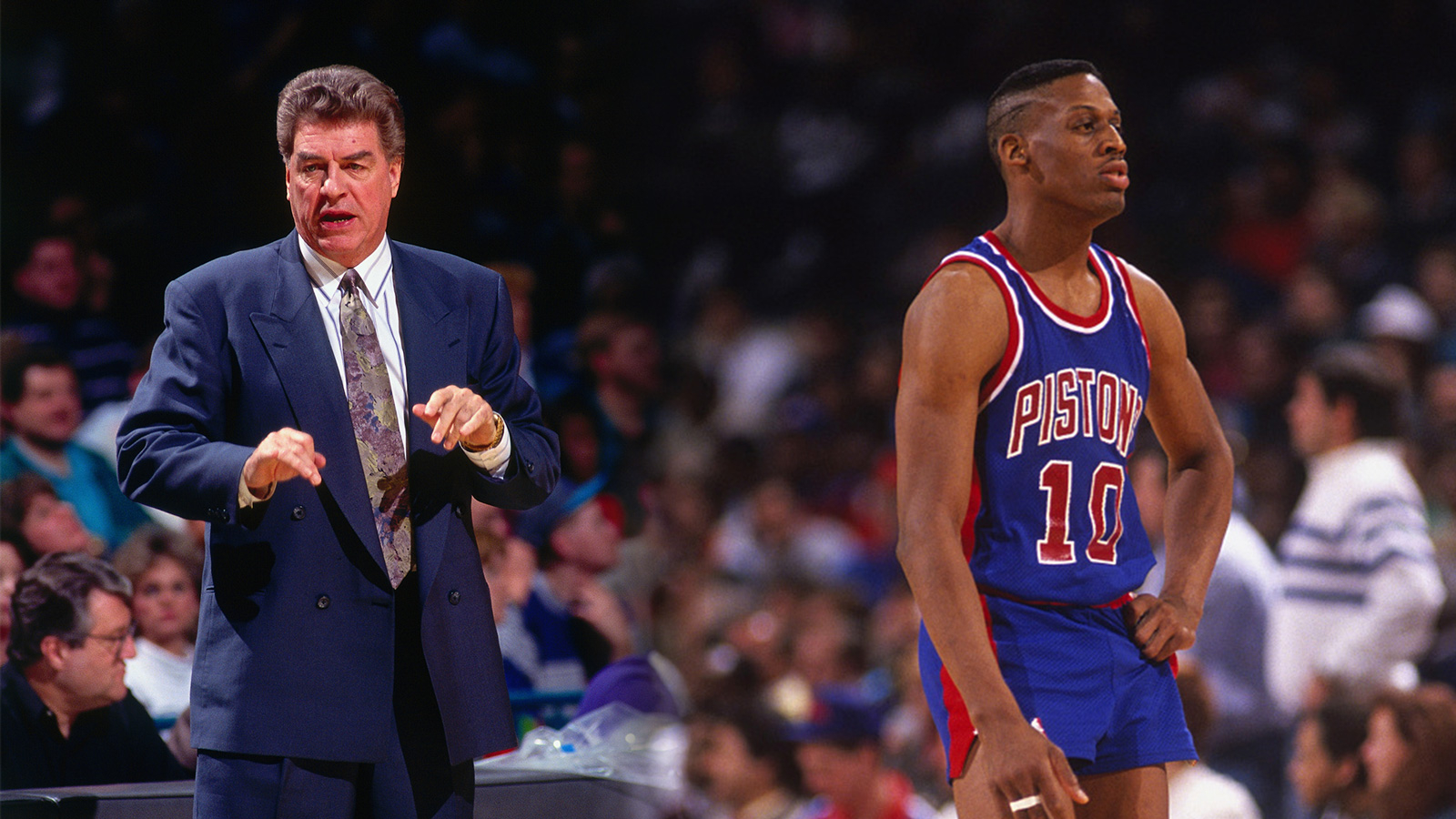
Chuck Daly (L), head coach of the Detroit Pistons and his player Dennis Rodman. /VCG
Chuck Daly (L), head coach of the Detroit Pistons and his player Dennis Rodman. /VCG
Fortunately, he joined the right team and met his father figure Chuck Daly who had his way with rebellious young men. Moreover, Rodman also met his game mentors, Bill Laimbeer and John Salley.
The Pistons saw Rodman's talents. Instead of jumping high, Rodman could jump consecutive times with almost the same height. He had remarkable body control and could read bouncing of the ball. These three specialties made him a great rebounder.
Rodman was also a cunning defender. He might not be fast but his quickness and smartness made him an all-round defender who could switch to cover either Jordan or Shaquille O'Neal. Besides, Rodman was a top flopper and good at inflaming the opponent's anger with trash talk – he did more mental damage to his defensive target.
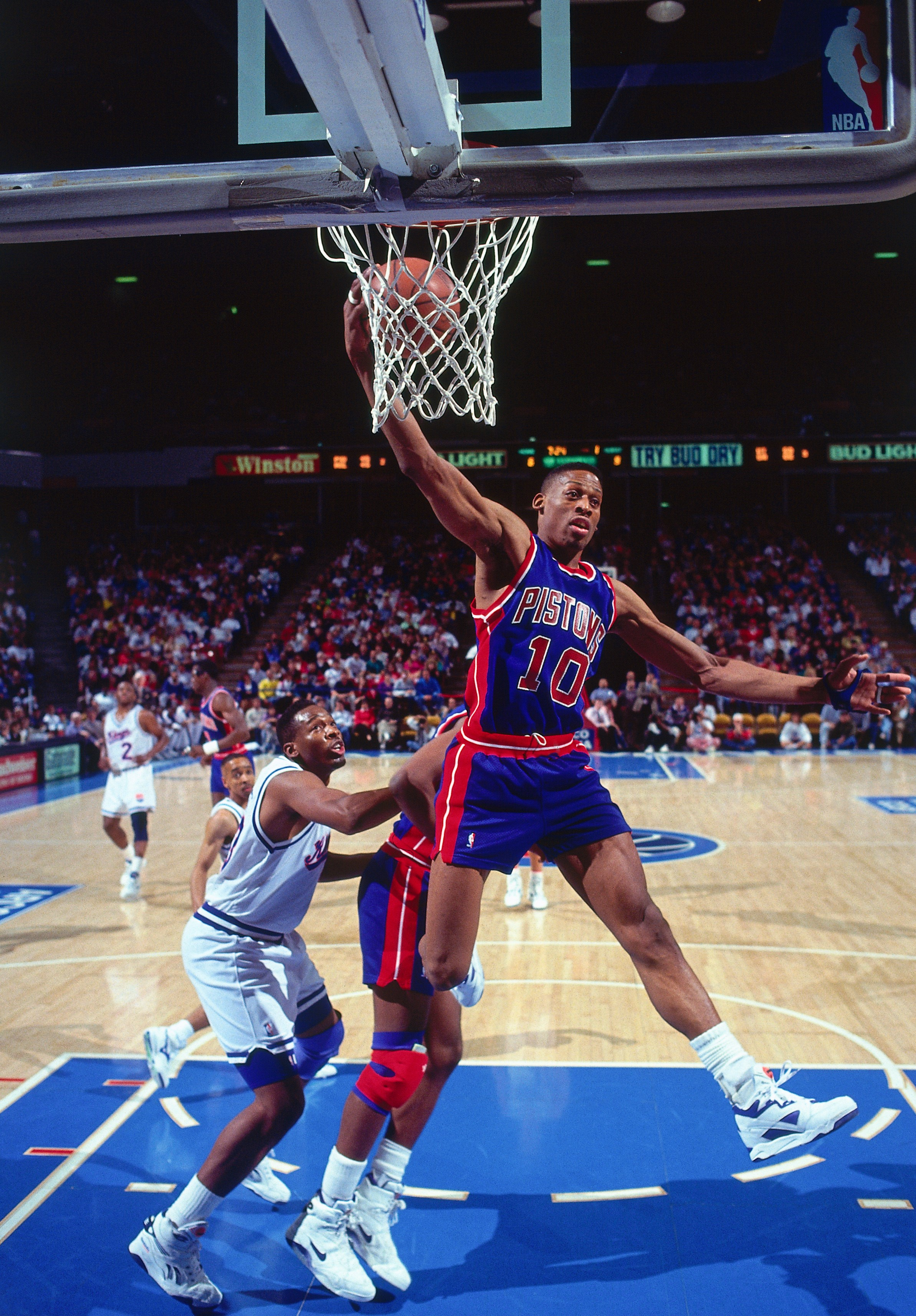
Dennis Rodman, #10 of the Detroit Pistons, grabs a rebound in the game against the Sacramento Kings at the Arco Arena in Sacramento, California, December 8, 1990. /VCG
Dennis Rodman, #10 of the Detroit Pistons, grabs a rebound in the game against the Sacramento Kings at the Arco Arena in Sacramento, California, December 8, 1990. /VCG
Rodman was never and could never be a scorer. His dribbling was terrible, just like his career free throw rate of 58.4 percent. However, he was a greatly underestimated passer and one of the best offensive rebounders in league history. As long as he did not have to hold the ball for too long, Rodman could fit in any offensive system.
As for Rodman, he loved playing for Daly, even if he's only a blue-collar piece of Detroit's champion puzzle. He was okay letting Laimbeer claim most of the defensive rebounds; he did not hesitate to put down Jordan with a brutal foul. The rest of the league both hated and feared them, but Rodman did not care – he was helping bring Daly's team to victory.
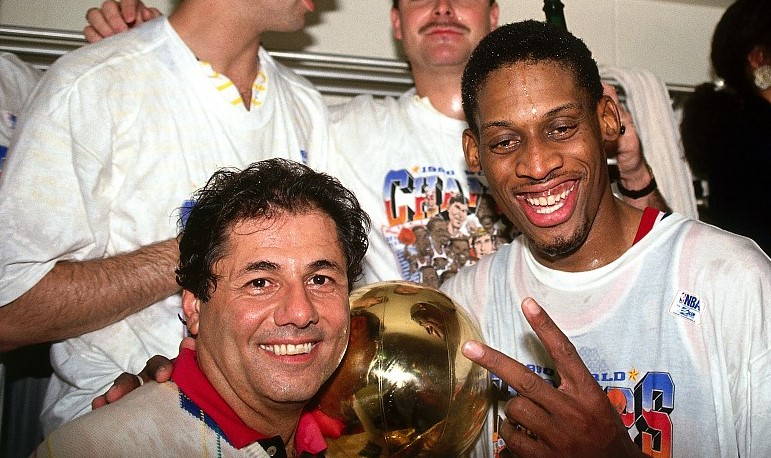
Dennis Rodman (R) of the Detroit Pistons celebrates winning the NBA championship afte the Pistons beat the Los Angeles Lakers 4-0 at the Great Western Forum, Inglewood, California, June 13, 1989. /VCG
Dennis Rodman (R) of the Detroit Pistons celebrates winning the NBA championship afte the Pistons beat the Los Angeles Lakers 4-0 at the Great Western Forum, Inglewood, California, June 13, 1989. /VCG
From 1988 to 1990, the Pistons kept knocking Jordan and his Bulls out in the playoffs while torturing elegant, popular geniuses like Magic Johnson or Clyde Drexler to win two titles after three NBA Finals.
Meanwhile, Rodman was named Defensive Player of the Year twice (1990 and 1991) and claimed his first rebounding champion in 1992. However, that's also the year he met the first turning point of his career: Daly left the Pistons.
After that, Rodman continued to grab rebounds but he began to connect his name to more crazy behaviors. The color of his hair kept changing; he continuously added tattoos all over his body; he skipped Detroit's training camp and refused to play road games; he headbutted John Stockton; he threw a bag of ice at his own head coach Bob Hill at the San Antonio Spurs; he refused to double team Hakeem Olajuwon in the Western Conference Finals and dissed his teammate David Robinson in his book:
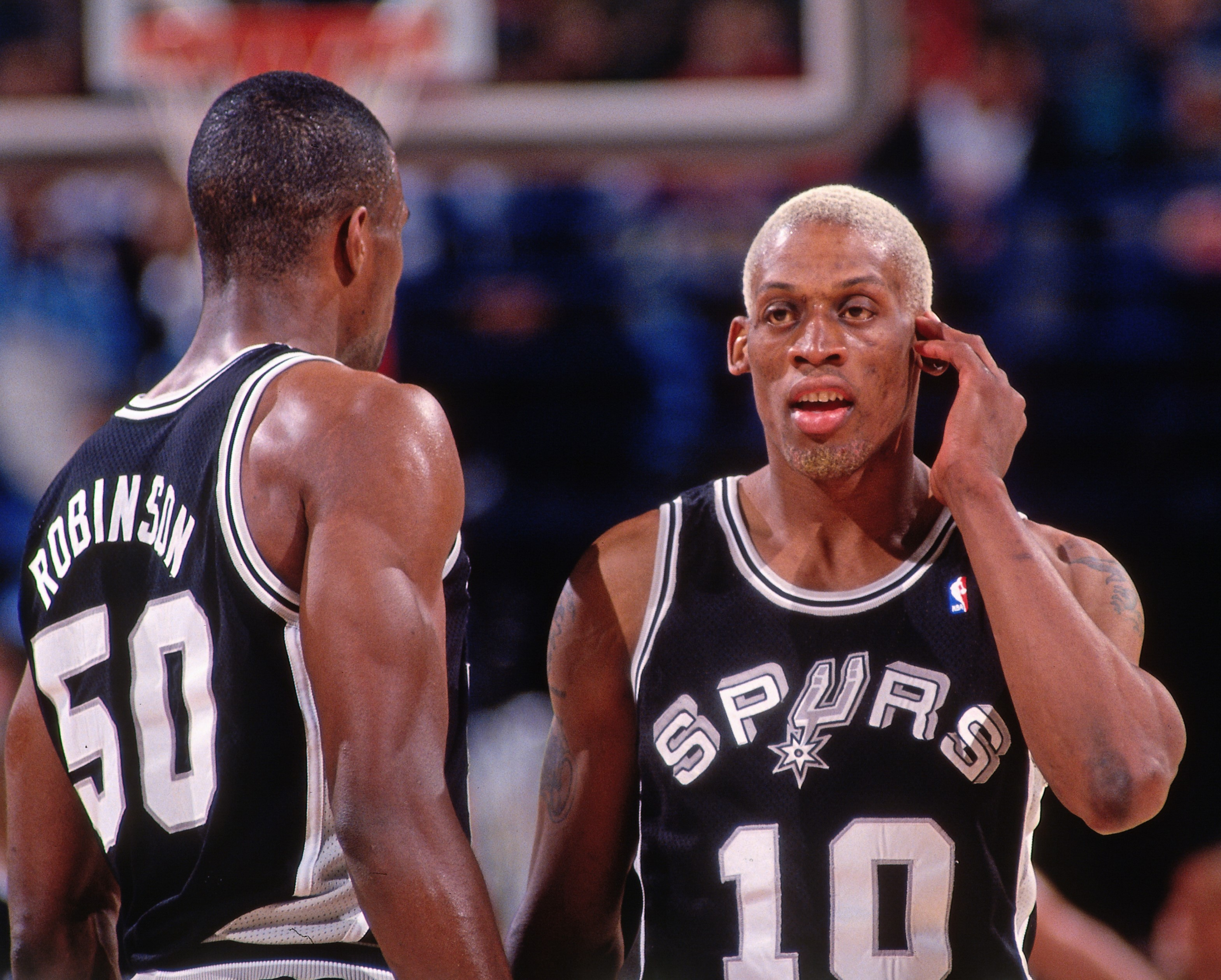
Dennis Rodman, #10 of the San Antoio Spurs, talks to his teammate David Robinson in the game against the Sacramento Kings at the Arco Arena in Sacramento, March 24, 1994. /VCG
Dennis Rodman, #10 of the San Antoio Spurs, talks to his teammate David Robinson in the game against the Sacramento Kings at the Arco Arena in Sacramento, March 24, 1994. /VCG
"(Robinson) got eaten alive by Hakeem Olajuwon that whole series. They asked me to guard Olajuwon, and I refused. Before those games, he looked so (expletive) scared in the locker room, he couldn't stop shaking," wrote Rodman.
That explained why Phil Jackson, head coach of the Bulls, called Daly in 1996 before the team landed Rodman – they wanted his game, but worried that he might hurt the team.
Then "the Worm" came and became "Dennis the Menace." Scottie Pippen understandably did not like him – they did not talk in the first month – after Rodman pushed him out of the court for six stiches in Game 4 of the 1991 Eastern Conference Finals. Nonetheless, that did not stop them from giving each other high-five from time to time.
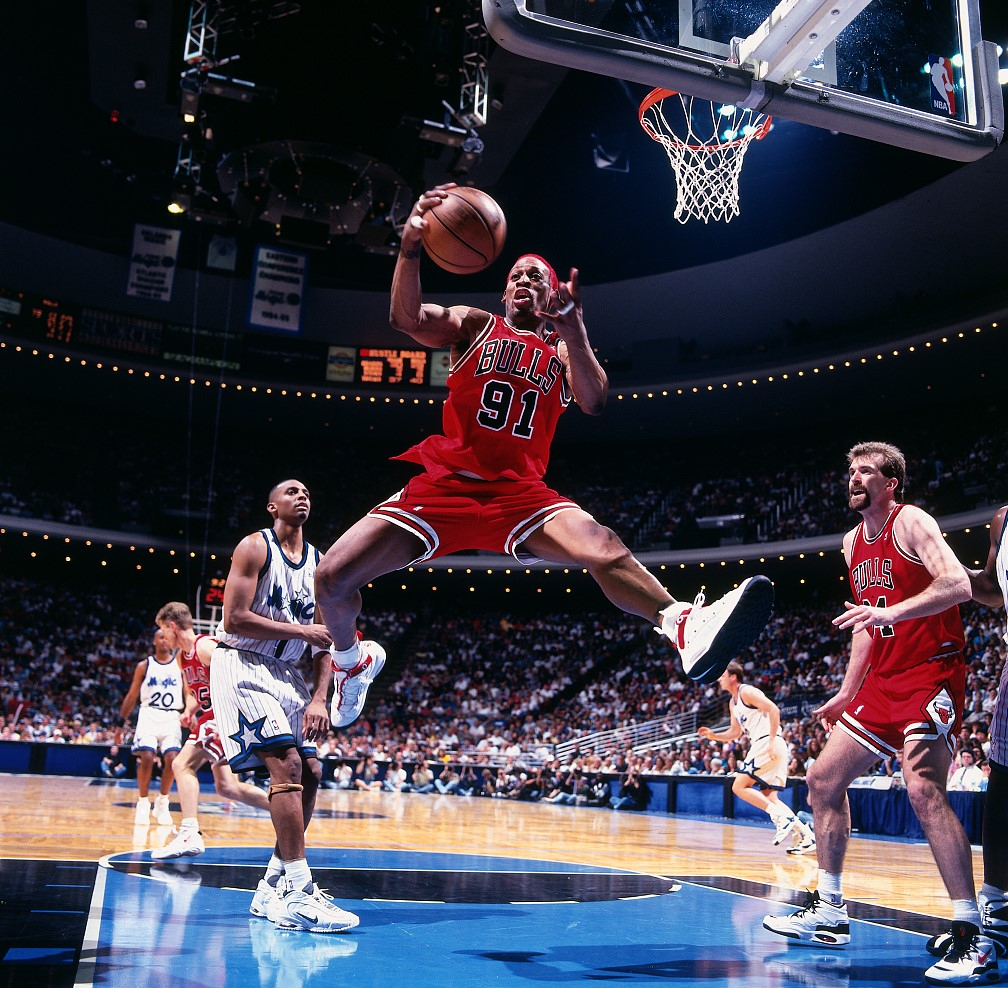
Dennis Rodman, #91 of the Chicago Bulls, grabs a rebound in the game against the Orlando Magic at the Orlando Arena in Orlando, Florida, April 7, 1996. /VCG
Dennis Rodman, #91 of the Chicago Bulls, grabs a rebound in the game against the Orlando Magic at the Orlando Arena in Orlando, Florida, April 7, 1996. /VCG
More importantly, Rodman made such a perfect part of Jackson's signature triangle offense. His passing, offensive rebounding and off-ball moving were built for the system. Furthermore, his cunning defense and outraging trash talks were also key to the Bulls' ball pressuring defense.
Moreover, Rodman had his highlights as well. In the last three games of the 1996 NBA Finals, the Gary Payton led the Seattle SuperSonics' forward squad to put Jordan in one of the biggest difficulties in his career. The Bulls watched their 3-0 lead narrowed to 3-2 before Game 6.
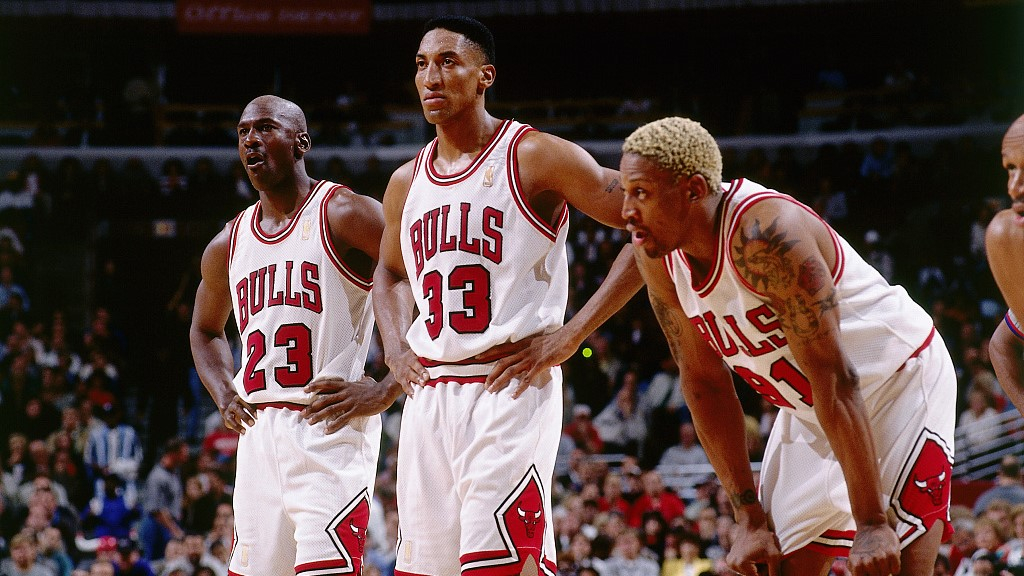
Michael Jordan, #23, Scottie Pippen, #33, and Dennis Rodman of the Chicago Bulls stand togehter in a game at the United Center in 1997. /VCG
Michael Jordan, #23, Scottie Pippen, #33, and Dennis Rodman of the Chicago Bulls stand togehter in a game at the United Center in 1997. /VCG
Jordan still could not find a way to break Seattle's defense on him as he went 5-19, but Rodman stood out and destroyed the opponents' rebounding. He grabbed a total of 19 rebounds, including 11 on the offensive glass. 87-75, Chicago won the championship 4-2.
"Dennis Rodman won them two ballgames in this series. Game 2 and tonight, he was the reason they were successful," said George Karl, head coach of the SuperSonics.